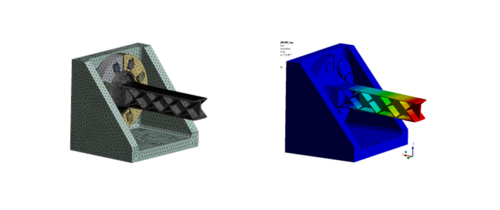The most relevant use case for TECHNYL® polyamides is for parts with demanding technical specifications in harsh environmental or chemical conditions from -40°C to more than +200°C, with complex mechanical loads. A complex design and development process then leads to the validation of the parts. Virtual prototyping and virtual testing play an increasingly important role in this process.
Here, MMI integrative mechanical simulation considering local glass-fiber orientation helps to evaluate and reliably prove the performance of the part by using numerical models for the parts and the polyamide material. Different part behaviors can be assessed, starting from calculations of local stresses and strains in the part, up to failure prediction.
And this can be done for different load cases, from static loads up to crash test simulation, thermal loads or fatigue.

